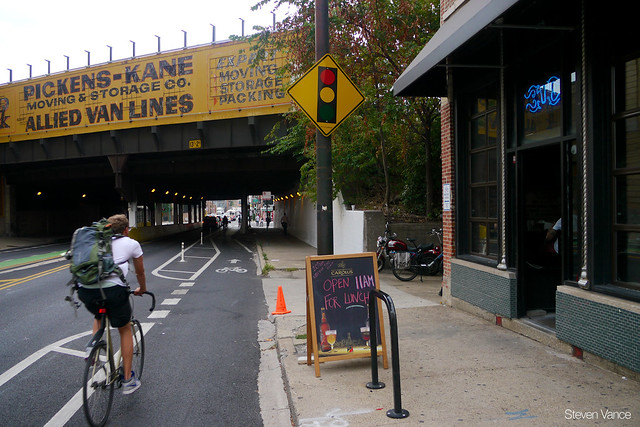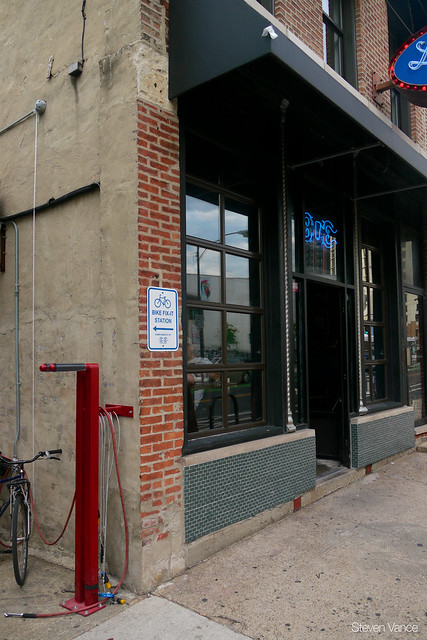New bike repair station at Paramount Room
Paramount Room (415 N Milwaukee, just south of the viaduct) now has a bicycle repair station outside. Pretty awesome for mid-commute emergency repairs!
http://www.dnainfo.com/chicago/20130911/west-town/paramount-room-of...
Tags:
Replies to This Discussion
-
Permalink Reply by Will on September 12, 2013 at 4:52am
-
+1
BruceBikes said:And I'm thrilled to see businesses on Milwaukee embracing cycling.
-
Permalink Reply by Steven Vance on September 12, 2013 at 5:41am
-
Cool. Thanks for the info.
The inner tubes for sale is great, too.
Will said:I've been a fan of Paramount Room since I moved to Chicago in 2008. They always have a nice little selection of craft beer on tap, and their food menu is really good.
I don't know how much the owner spent on this station, but I asked him, and he did pay for it out of his own pocket, and it was his idea, no one approached him asking for it. The city removed all the parking on the block where Paramount is located when the PBL was built. They were free parking spots, even. Let's just say the removal of the parking hasn't been a positive thing for business, but he's looking to help turn that around with the repair station.
FYI, they're also offering some inner tubes for sale.
-
Permalink Reply by Andrew Bedno on September 12, 2013 at 6:38am
-
I've added this to MassUp's database of bike shops and repair stations. Automatically find one's nearest you: http://massup.us/service
-
Permalink Reply by Tom Dworzanski on September 12, 2013 at 8:05am
-
Agreed. And significance matters.
h' 1.0 said:I'm not comfortable with the assumption that removing the parking had a negative effect on business without some sort of clear evidence-based statement to that effect.
-
Permalink Reply by Will on September 12, 2013 at 8:54am
-
I really don't understand what this line of commentary has to do with the bike repair station. Do you see it as an attack on you or on cycling or on the bike lanes that a business owner might see fewer customers when parking spots in front of his business are removed?
Tom Dworzanski said:Agreed. And significance matters.
h' 1.0 said:I'm not comfortable with the assumption that removing the parking had a negative effect on business without some sort of clear evidence-based statement to that effect.
-
Permalink Reply by Steven Vance on September 12, 2013 at 9:30am
-
Permalink Reply by Tom Dworzanski on September 12, 2013 at 9:49am
-
I'm interested in the economics of parking spots, bicycle lanes, and these sorts of cyclist magnets, especially related to the small businesses they impact. These things are all very closely related (and very germane as the station exists as a result of the former and latter). I want to understand how significant parking and bike lanes really are in this situation and to a lesser extent, if the repair station makes any significant difference for this business and the stakeholders faced with a changing street configuration.
You reported the basics of what the owner told you and that's wonderful. However (and I think this is in the spirit of what h' said but I can't be positive), there is a difference between losing 0.1% of your customers and 10% of your customers as a result of losing parking. And that has to be netted with the advantages of increased non-motorized traffic potentially augmented by the added attraction of a repair station.Significance matters. In this situation it matters a lot because it could make the difference between more cycling infrastructure and less for the rest of us as businesses lobby in the face of change. Businesses have to be sustainable before and after these changes. A simple binary "more customers vs fewer customers" measure isn't very useful and can be deceptive (even if it's not meant to be). You really need to know some numbers to make the simplest of conclusions. Ideally businesses (on average) should be the same or better off than they were before. They certainly shouldn't be much worse off and if they are much better off then that's great and this whole topic does not deserve so much concern.
I'm glad the station exists.
Will said:I really don't understand what this line of commentary has to do with the bike repair station. Do you see it as an attack on you or on cycling or on the bike lanes that a business owner might see fewer customers when parking spots in front of his business are removed?
Tom Dworzanski said:Agreed. And significance matters.
h' 1.0 said:I'm not comfortable with the assumption that removing the parking had a negative effect on business without some sort of clear evidence-based statement to that effect.
-
Permalink Reply by Will on September 12, 2013 at 11:26am
-
Every situation is different, and there are some unique things about Paramount Room and its location. There is no other consumer business on the block (there is another bar on the corner of Milwaukee and Desplaines now, but it's new-ish). The parking that was on that block of Milwaukee before the PBL was actually free, believe it or not, which influenced the habits of customers. The viaduct creates a bit of a psychological barrier to parking north of Paramount and walking to it, and there is no parking south on Desplaines. There are a few spaces east on Desplaines, but the most reliable place to find a spot is Hubbard.
I can tell you that before the PBL, on any given night, all the cars parked on that block, northbound and southbound, would very likely have been people at Paramount. That's not to say none of those people are returning, but it was pretty much Paramount-only parking, because it just wasn't a good place to park if your destination was someplace else.
In a different location on Milwaukee (let's say between Division and North) loss of some parking spots might not cause any noticeable difference to a business, since there is so much foot traffic and so much consumer business in the area anyway. But this location is somewhat different. Anyway, the owner doesn't complain, he didn't complain to CDOT when they informed him about the plan, and he's not complaining now. He's making lemonade.
Tom Dworzanski said:I'm interested in the economics of parking spots, bicycle lanes, and these sorts of cyclist magnets, especially related to the small businesses they impact. These things are all very closely related (and very germane as the station exists as a result of the former and latter). I want to understand how significant parking and bike lanes really are in this situation and to a lesser extent, if the repair station makes any significant difference for this business and the stakeholders faced with a changing street configuration.
You reported the basics of what the owner told you and that's wonderful. However (and I think this is in the spirit of what h' said but I can't be positive), there is a difference between losing 0.1% of your customers and 10% of your customers as a result of losing parking. And that has to be netted with the advantages of increased non-motorized traffic potentially augmented by the added attraction of a repair station.Significance matters. In this situation it matters a lot because it could make the difference between more cycling infrastructure and less for the rest of us as businesses lobby in the face of change. Businesses have to be sustainable before and after these changes. A simple binary "more customers vs fewer customers" measure isn't very useful and can be deceptive (even if it's not meant to be). You really need to know some numbers to make the simplest of conclusions. Ideally businesses (on average) should be the same or better off than they were before. They certainly shouldn't be much worse off and if they are much better off then that's great and this whole topic does not deserve so much concern.
I'm glad the station exists.
-
Permalink Reply by Tom Dworzanski on September 12, 2013 at 2:48pm
-
That's good to know. I'm glad he's supporting cyclists and adapting. I checked out the website and think I'll stop by for lunch some time next week.
Will said:Every situation is different, and there are some unique things about Paramount Room and its location. There is no other consumer business on the block (there is another bar on the corner of Milwaukee and Desplaines now, but it's new-ish). The parking that was on that block of Milwaukee before the PBL was actually free, believe it or not, which influenced the habits of customers. The viaduct creates a bit of a psychological barrier to parking north of Paramount and walking to it, and there is no parking south on Desplaines. There are a few spaces east on Desplaines, but the most reliable place to find a spot is Hubbard.
I can tell you that before the PBL, on any given night, all the cars parked on that block, northbound and southbound, would very likely have been people at Paramount. That's not to say none of those people are returning, but it was pretty much Paramount-only parking, because it just wasn't a good place to park if your destination was someplace else.
In a different location on Milwaukee (let's say between Division and North) loss of some parking spots might not cause any noticeable difference to a business, since there is so much foot traffic and so much consumer business in the area anyway. But this location is somewhat different. Anyway, the owner doesn't complain, he didn't complain to CDOT when they informed him about the plan, and he's not complaining now. He's making lemonade.
Tom Dworzanski said:I'm interested in the economics of parking spots, bicycle lanes, and these sorts of cyclist magnets, especially related to the small businesses they impact. These things are all very closely related (and very germane as the station exists as a result of the former and latter). I want to understand how significant parking and bike lanes really are in this situation and to a lesser extent, if the repair station makes any significant difference for this business and the stakeholders faced with a changing street configuration.
You reported the basics of what the owner told you and that's wonderful. However (and I think this is in the spirit of what h' said but I can't be positive), there is a difference between losing 0.1% of your customers and 10% of your customers as a result of losing parking. And that has to be netted with the advantages of increased non-motorized traffic potentially augmented by the added attraction of a repair station.Significance matters. In this situation it matters a lot because it could make the difference between more cycling infrastructure and less for the rest of us as businesses lobby in the face of change. Businesses have to be sustainable before and after these changes. A simple binary "more customers vs fewer customers" measure isn't very useful and can be deceptive (even if it's not meant to be). You really need to know some numbers to make the simplest of conclusions. Ideally businesses (on average) should be the same or better off than they were before. They certainly shouldn't be much worse off and if they are much better off then that's great and this whole topic does not deserve so much concern.
I'm glad the station exists.
- ‹ Previous
- 1
- 2
- Next ›
Groups
-
Chicagoland Beer Explora…
203 members
-
British Bicycles of Chic…
172 members
-
Wednesday Night for Mort…
1 member
-
Great Lakes Ultra Cycling
270 members
-
Major Taylor Internation…
1 member


